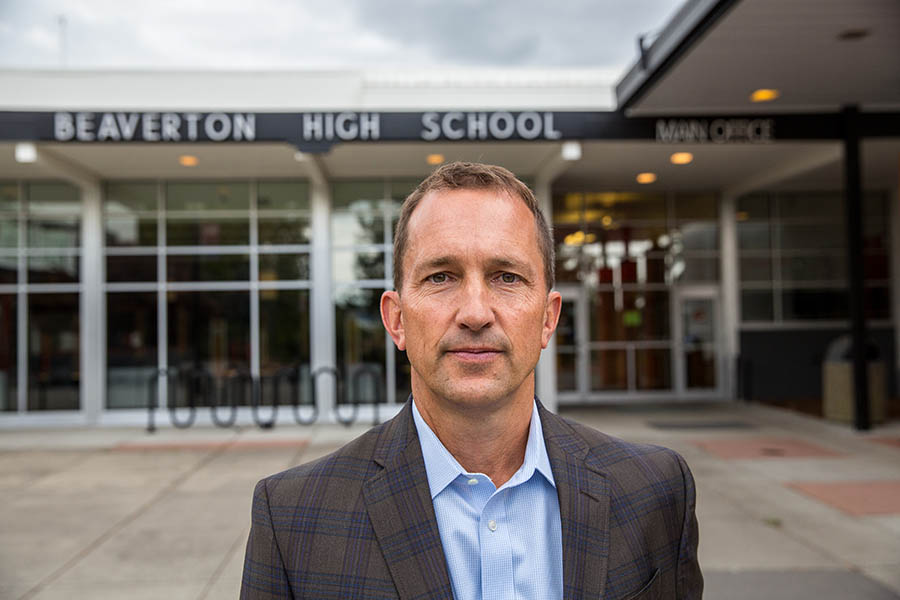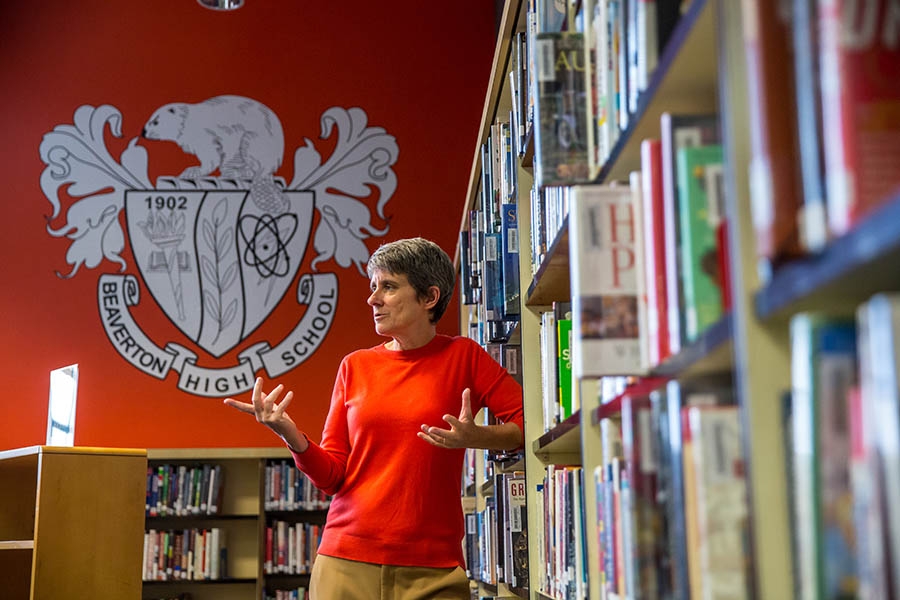The Beaverton High School Success Fund proves that public schools can raise substantial private money. Should this be the future of school funding?
Doug Johanson believes in public schools.
As CEO of Vista Capital Partners, a private wealth management firm located in unincorporated Washington County, the options for his children’s education seem limitless. Prestigious Westside private schools — such as Oregon Episcopal School, Jesuit High School or Catlin Gabel — all sit within reach, as does Beaverton School District’s better-performing schools, such as Southridge High School or the Health and Science School.
But Johanson didn’t send his three children to any of those. They attend, or are recently graduated from, his alma mater: Beaverton High School.
 Beaverton High School alum, parent and Success Fund board member Doug Johanson
Beaverton High School alum, parent and Success Fund board member Doug Johanson
Located in the city center, Beaverton High School is the district’s oldest high school. It’s also one of the poorest. Forty-six percent of the student body qualify for free or reduced-price lunch, and last year 150 students identified as homeless.
State-mandated Smarter Balanced test scores, which measure overall student proficiency in math and reading, are low. US News grades Beaverton High School 33.3 out of 100 on their College Readiness Index.
So why did Johanson and his wife, Kristen, choose Beaverton High School?
“There’s an emotional intelligence that comes from attending a socio-economically and ethnically diverse school. Kristen and I wanted our kids to feel like part of the community and have an opportunity for connection and support,” he says. “That’s an important part of raising a happy and successful adult.”
Johanson knows he’s an outlier, acknowledging that it’s uncommon for someone in his position to send their kids to the local public school, particularly a low-performing, high-poverty one like Beaverton High School. “I think that’s a shame,” he insists. But along with valuing his family’s place in Beaverton’s inner-city community, Johanson knows that his local public school has two powerful weapons poised to improve the school’s trajectory.
The first is Dr. Anne Erwin, the business-savvy principal who can rally parents, alumni and local companies around a cause.
The second is the Beaverton High School Success Fund, an independent 501(c)(3) nonprofit that’s raised an eye-popping $5 million over the past six years and has a goal to raise another $5 million. (For comparison, the Beaverton Education Foundation, which funds programs for all of the district’s 53 schools, has invested nearly the same amount, $4.17 million, since 1988.)
That money has brought transformative, long-lasting change to the high school in the form of facility improvements, scholarships, field trips and new equipment. Beaverton High School Success Fund champions tout it as a way forward, not only for Beaverton High School but for all the cash-strapped schools in the district and beyond.
“This proves that people are willing to give to their public high schools in the same way they give to their colleges or private high schools,” says Johanson, who sits on the fund’s board. “And they should, right?”
Sure … but this isn’t some small-stakes bake sale or car wash. School funding on this scale usually comes from taxes, specifically property taxes.
And there’s the problem. Most Oregon school districts have suffered since the 1990 passing of Measure 5. A cap on property taxes, the measure was sold as a way to distribute resources more fairly to districts throughout the state. Measure 5 supporters argued that any shortfall brought on by capping property taxes — the historic source of school funding — would be covered by income taxes.
Nearly 30 years later, the results are mixed at best. A few rural districts have seen better, more stable funding while the rest, particularly in urban and suburban districts like Beaverton, see less. Relying on income taxes, an unstable funding source, to pay for schools complicates the issue.
Erwin experienced that volatility in 2012, her first year at Beaverton High School. A difficult budget year, the district weathered big faculty layoffs. Then halfway through the 2013-14 school year, Erwin got the okay to hire five new teachers.
“It became increasingly apparent that it was going to be difficult to make transformative change with this whipsaw nature of funding,” she recalls.
In her mind, she needed to do two things to bring any long-lasting transformations to the school. “We needed to get a better sense of who we are and where we’re trying to go,” she says. “And we needed to find some additional, sustainable resources.”
Erwin put together a small roundtable of parents, alumni and local business leaders, including Johanson, to help guide her thinking. The group honed a strategy and visioned a path forward. The goal: transforming Beaverton High School into a 21st-century school that can “meet the needs of an increasingly diverse student body and prepare them for a future that is continually changing.”
Success, in the form of dollars, came surprisingly fast. An alumnus offered $250,000 as a startup gift and pledged another $125,000 if the school could match it. “That put the wind in our sails,” says Johanson. He describes the next three years as a whirlwind of setting up the nonprofit and building the infrastructure to raise and spend money.
Then they landed a whale. Another highly successful alumnus ponied up $3 million, with $1 million earmarked for facility improvements. The other $2 million could be spent as needed. “This changed the nature of what we thought we could do,” says Erwin. “My teachers had been living in the land of ‘no’ for so long that they stopped asking for things.”
The Beaverton High School Success Fund erased that mind-set. Today the library, community center and college/career center have been updated into flexible, collaborative workspaces. The teachers’ lounge and a few classrooms also got a face-lift.
Aside from capital improvements, there’s now money for new equipment like digital printers and bio lab software. There’s money for field trips, money for the counselling department to support students in need, money for college scholarships and money for Future Day, where every 9th and 10th grader gets to visit a local college, business or manufacturing site.
“Future Day is a $20,000 experience,” says Erwin. “We couldn’t do that with state funds.”
With the infrastructure in place, success has begotten more success. The class of 1978 holds a yearly golf tournament to raise money for the marketing program. Broadway star and Beaverton High School alum Shoshana Bean held two benefit concerts at the school.
“I don’t know how to put on a concert,” says Erwin, “but I had the support and community to say yes and pull it off.”
The activity caught the attention of Accenture. The global tech consulting firm opened an office in the nearby Tanasbourne neighborhood in 2017 and was looking for a high school in need. Impressed with Erwin’s “bold vision,” it signed up to support the school with money, time and expertise.
“Accenture’s support of Beaverton High School represents our strong commitment to corporate citizenship, [to] volunteerism and to supporting the local communities we call home,” says Bob Berkey, Accenture’s Portland office lead, via email.
 The stadium plaza gets a facelift with Success Fund dollars.
The stadium plaza gets a facelift with Success Fund dollars.
There’s no arguing that the Beaverton High School Success Fund has been effective. And other schools and districts are jumping on the foundation bandwagon. Portland School District recently started the Fund for Portland Public Schools as a vehicle to tap wealthy individual and corporate donors. The Lake Oswego Schools Foundation raised around $1.5 million for the 2014-15 school year.
But is this fair? After all, public education is supposed to be a public good, yet most teachers around the district, state and country “live in the land of ‘no.’” Doesn’t asking wealthy donors and private business to prop up public schools call into question the very idea of equity in education?
“In the absence of state action to adequately fund schools, one can understand why communities would turn to the business community and alumni to boost funding for their schools,” says Juan Carlos Ordóñez, communications director for the Oregon Center for Public Policy, via email. “But this is neither ideal nor equitable, since some communities lack the resources to raise funds this way.”
He suggests closing local tax abatements that translate into fewer school resources rather than appealing to the charitable inclination of local business.
Erwin, however, stands by the approach. “Equitable doesn’t mean equal,” she counters. “It means the resources come to the school and the students in the way that they need them.”
She notes that large private gifts to public schools are nothing new, pointing to nearby Sunset High School receiving a $4.4 million anonymous donation to renovate some athletic fields in 2014. Erwin is also generous with her time, carving out space to meet other school administrators eager to copy her approach.
The fund certainly has the support of the district. “We believe in parent and community partnerships and encourage this kind of engagement,” says Beaverton School District spokesperson Maureen Wheeler.
Wheeler acknowledges that the Beaverton High School Success Fund — which is really a super-charged, highly efficient parent-teacher organization — takes the concept of community engagement about as far as it can go.
Still, she admits that $5 million is not a solution to the “mega-millions-level” funding problems the district has experienced since the passing of Measure 5 almost 30 years ago.
But now, a generation later, Oregonians might see a fix.
The Student Success Act, a historic $1 billion per year tax on business, was passed this legislative session with wide support from business groups. Oregon Business Industry, the state’s largest business lobby, was officially neutral on the policy. Oregon Manufacturers and Commerce, another business lobby, opposes the act but dropped efforts to refer it back to voters as a ballot measure.
Whatever the success of the new legislation, the Beaverton High School Success Fund proves business financing of specific public schools is one part of the solution to filling in the funding gap.
To subscribe to Oregon Business, click here.







